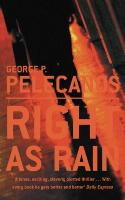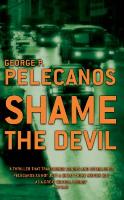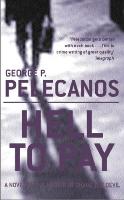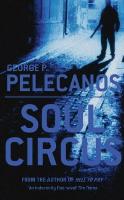Ali :
|
Welcome to Shots Ezine. You’ve brought some good weather, especially as last year you were snowbound at Washington Airport….
|
George :
|
Hey, Ali, it’s great to be over again and sorry I missed you guys last year.
|
Ali :
|
So what are your plans while in the UK?
|
George :
|
I’m a working man. I’m just doing what the publishers tell me to do. They’re moving me around like a chess piece. I was in London last night, Manchester today then I’m heading up to Glasgow and then Dublin and then back to London at the end of the week.
|
Ali :
|
Wow, traversing the UK and Ireland!
|
George :
|
I had a real nice signing in London last night as well as a lot of press interviews and meetings. I’m a working man!
|
Ali :
|
Moving onto Hard Revolution which has just come out in hardcover. It’s been greeted with tremendous anticipation and also great critical acclaim. But in some quarters it’s been mooted as less of crime novel and more of a literary work. How do you feel about that and genre classifications?
|
George :
|
It doesn’t concern me. When I sit down to write a book, I’m just trying to write a good book. Rest assured though, I am still going to deliver the crime fiction goods. I have no hang ups about being a crime novelist because that is what I am. In fact there are parts in this book that I really hammer it home, like the robbery sequence as an example. In effect, this is me saying ‘don’t forget who I am’.
|
Ali :
|
When you started the Strange/Quinn series with Right As Rain, did you realise that the books would be so popular and that you had a series emerging from that book?
|
George :
|
 No I didn’t. I was just trying to write one book with Right As Rain. I didn’t even know that Quinn as a character was going to continue, or work for Derek Strange for that matter. I guess I was trying to see if the characters worked and most crucially whether the book would work. As it went it along I got the feeling that Strange was going to be the vehicle that would allow me to tell the story of this big sixties book that I had wanted write for a long time. It was, I guess, about halfway through Right As Rain that I realised this, and I started to drop clues in the three books about his past that I would later use in Hard Revolution. No I didn’t. I was just trying to write one book with Right As Rain. I didn’t even know that Quinn as a character was going to continue, or work for Derek Strange for that matter. I guess I was trying to see if the characters worked and most crucially whether the book would work. As it went it along I got the feeling that Strange was going to be the vehicle that would allow me to tell the story of this big sixties book that I had wanted write for a long time. It was, I guess, about halfway through Right As Rain that I realised this, and I started to drop clues in the three books about his past that I would later use in Hard Revolution.
|
Ali :
|
One of the aspects within Hard Revolution and, to be fair, in all of your work is the importance of ‘family’ as a backdrop. Does this come from your own family or perhaps your observation of the lack of family in today’s inner-city youth?
|
George :
|
It’s both. My personal history echoes the importance of family. There is no question that I wouldn’t be here as a semi-successful writer and as a man if it weren’t for my parents. Most crucially in the example they showed me in terms of work ethic, that an adult gets up everyday, goes to work and takes care of his family. As you know I have worked very hard over the years and have been prolific in terms of writing.
|
Ali :
|
Twelve books in twelve years apart from all your other TV, video work and your family…
|
George :
|
Thanks, and yes work ethic is important to me, but it came from my parents. The other side is when I’m out there doing my research, talking and working with kids who have gotten onto the wrong side of things or down the darker corners of life, and into the cracks in society. Everybody I see like that has had a bad history at home. They don’t have a father at home; some of them don’t even have a mother around. That’s the key element - I can’t blame the government, I can’t blame the politicians because it’s the lack of family that set those kids down the wrong path to sell drugs. It’s not about drugs; it’s about trying to belong to something. If the kids don’t have a stable family, they look for belonging elsewhere.
|
Ali :
|
Coming back to Hard Revolution, were you nervous fictionalising a pivotal moment in US history such as the civil unrest that followed the assassination of Dr Martin Luther King?
|
George :
|
I knew it was going to be a tough book to write and that I was setting myself up for both failure and criticism if I didn’t do it right, if I didn’t nail it. I’ve been at this point a few times before in my career, for example with The Big Blowdown I was ‘sweating through the fences’, to use a baseball metaphor. The challenge was there, as were my ambitions, so I knew from the outset that I had set myself a big challenge.
|
Ali :
|
Hard Revolution has a split time frame. At the start we have the late fifties and Strange being a boy and then the late sixties when Strange is a man. How do you get ‘into character’ when writing about the past? In the first period you’d have been….
|
George :
|
An infant, a toddler in fact….
|
Ali :
|
And in the second section you’d have been, what, 11 or 12?
|
George :
|
Yes I’d have been 12.
|
Ali :
|
So how do you write about events when you were either an infant or an adolescent? When I read Hard Revolution I found your writing very evocative of both those periods of time.
|
George :
|
I’m lucky I guess, as I’ve lived in the same place right through my life, so I’ve listened to stories about time periods that I didn’t live through or if I did, I was too young or immature to truly understand. These stories came from people who did. I also went out and talked to people, just like we’re doing right now. I went out like you with a tape-recorder and talked to people for hours and hours and by the time I was ready to write the book I had a huge amount of files and tapes.
|
Ali :
|
And these being first-hand accounts?
|
George :
|
Yes, even in the 1959 section of Hard Revolution I found a guy in my neighbourhood who was a greaser, a hot-rod enthusiast, and a real tough-guy. He was the kind of guy who would go into bars with a Derringer in his boot and a blade in his belt. This guy was totally willing to talk to me because he didn’t care. He’s a good father and a good provider now and a middle-aged man. It’s all in his past now. When you find a source like that, you’ve really hit the jackpot as you get to really find out what went on.
|
Ali :
|
I was fortunate enough to listen to this eclectic CD you compiled to accompany Hard Revolution. How did this CD come about and, as the era was full of a great beat, what tracks did you have to miss out?
|
George :
|
 I got to thank Mike Connelly, as I’d wanted to do this for a long time, right back to when I finished King Suckerman as that was a perfect book to have an accompanying soundtrack CD. But the publisher wasn’t really interested and couldn’t see the vision of it. Then Connelly persuaded his publishers to release a CD to his last Harry Bosch book Lost Light and it worked. They saw an increase in sales of his books and an interest in Lost Light. So basically Mike Connelly kicked the door in for me so my publishers allowed me to do this. I did run into roadblocks when I tried to get certain artists, particularly from the smaller labels, oddly enough, as those songs cost a hell of lot more to license than those from the bigger labels. I got to thank Mike Connelly, as I’d wanted to do this for a long time, right back to when I finished King Suckerman as that was a perfect book to have an accompanying soundtrack CD. But the publisher wasn’t really interested and couldn’t see the vision of it. Then Connelly persuaded his publishers to release a CD to his last Harry Bosch book Lost Light and it worked. They saw an increase in sales of his books and an interest in Lost Light. So basically Mike Connelly kicked the door in for me so my publishers allowed me to do this. I did run into roadblocks when I tried to get certain artists, particularly from the smaller labels, oddly enough, as those songs cost a hell of lot more to license than those from the bigger labels.
|
Ali :
|
Weird. I would have thought it’d be the other way around?
|
George :
|
Well the reason is because the smaller labels don’t do it much, so they try and get as much cash from licensing as they can. The flip-side was that I could get as much from Motown as I wanted - problem was I was not looking for Motown. I wanted Deep Soul, Southern Soul, Staxx Volts stuff - the stuff I imagined that Strange would listen to.
|
Ali :
|
What I find interesting is that I’m a big Soul fan, but I also like Steve Earle, Springsteen, and in your work you make reference to the diversity of music, so as music features so heavily in your writing did you ever consider a musical career?
|
George :
|
Yeah I did but the problem was I had no aptitude for it. I tried playing trumpet for a few years, but I was no good at it.
|
Ali :
|
What you do have is an aptitude for writing, so tell us a little about your TV work, and when are we going to get a look at The Wire?
|
George :
|
It was sold to the UK and it is supposed to be on this autumn. I heard it’s either Channel 4 or Sky TV.
|
Ali :
|
I hear you’ve roped two of my favourite writers, Dennis Lehane and Richard Price, to work on The Wire. How did that come about? They are BIG writers so howdya get them?
|
George :
|
 I actually sort of conned Richard into it. I looked him up when we were in New York, as we organised all the writers for a brain-storming session and we brought him up to act in an episode for the second season to play a prison librarian…..and so he had a role in The Wire….we were in fact buttering him up to write for us. So he came up to New York while we brainstormed for the third season. He was enthusiastic about the show and we talked him into writing for us, so, when we asked him to write a show, he actually agreed to write two. Lehane was a little easier as we already had Price on board. We sent Lehane a set of DVDs of the show and he watched them in succession and signed up right away. I actually sort of conned Richard into it. I looked him up when we were in New York, as we organised all the writers for a brain-storming session and we brought him up to act in an episode for the second season to play a prison librarian…..and so he had a role in The Wire….we were in fact buttering him up to write for us. So he came up to New York while we brainstormed for the third season. He was enthusiastic about the show and we talked him into writing for us, so, when we asked him to write a show, he actually agreed to write two. Lehane was a little easier as we already had Price on board. We sent Lehane a set of DVDs of the show and he watched them in succession and signed up right away.
|
Ali :
|
I’m impressed. I loved Richard Price’s work and he was over in the UK last year as a guest of The Hay Festival of Literature.
|
George :
|
The Samaritan is outstanding, as are all the books by Richard Price.
|
Ali :
|
Agreed, and I’m a huge follower of the works of Dennis Lehane, and thought that Shutter Island was outstanding, even if it did divide his fans. Many people I guess missed his Patrick Kenzie and Angela Gennaro books while I thought Shutter Island was his most challenging book so far.
|
George :
|
You’re right. People often want you to keep writing the same books basically, especially his long-time fans. I think Lehane’s passed that now. Shutter Island was not going to be another Mystic River but I thought that it was totally mind-blowing. When you get to the end of that book, it reminded me of reading Pick-Up by Charles Willeford, - when you get to the end, you gotta to go right back and read the first chapter again.
|
Ali :
|
Back to your own work, we hear you’ve signed up to a three-book deal, the first being Drama City?
|
George :
|
Yes, that’s right, the next book is entitled Drama City.
|
Ali :
|
How the hell do you find time between the novels and The Wire?
|
George :
|
It’s difficult, believe me. When I started Drama City I knew I had to get the book out by the end of the year (2003), because I was going to be wiped out time-wise later this year (2004) between writing for The Wire and promoting Hard Revolution. I actually locked myself in the house for four months to write Drama City, so I didn’t do anything in the last four months of last year but write the novel. I got lucky, because everyone likes it and I like it; so hey, it’s hard work man, but I don’t have any hobbies, I just like to work. I’m enjoying it.
|
Ali :
|
I’m really anticipating Mike Connelly’s follow-up to The Poet, the long awaited The Narrows…..but no review copies. Have you managed to get a copy?
|
George :
|
Nope, Little Brown haven’t even been able to get me a copy, real unusual, so what I did was re-read The Poet in anticipation as I really want to be ready when The Narrows comes out. From what I’ve heard, there are a few shocks in the book and they don’t want people to know about these things and leak it out over the internet. But I have heard that some people have somehow had copies and Mike’s releasing a DVD to accompany the book.
|
Ali :
|
Does that put pressure on you? Are you going to come up with a DVD for Drama City?
|
George :
|
I don’t think so. Mike paid for that himself and I not in a position to do that. Besides no one wants to see me anyway…
|
Ali :
|
One thing I wanted to talk about relates to the ending of Soul Circus, which has just been released in paperback from Orion UK. It has a major shock at the climax. What annoys me is that I’ve seen reviewers who’ve actually given away the ending. What’s your view on this matter?
|
George :
|
I can’t control it. In fact I did a reading in Washington a couple of weeks ago - there had to be over 150 people there, when this guys says……'why’d you do whatever’ - he actually gave away the twist. There was this collective groan in the crowd as there were people who hadn’t read it. But philosophically speaking, remember people still saw The Crying Game even though they knew the woman had a dick…..
|
Ali :
|
…laughing….for people who haven’t read it yet, just to let you know that the reference to dicks has nothing at all to do with the surprise ending of Soul Circus.
|
George :
|
Hold on Ali….that is an idea for a future book…laughing…..
|
Ali :
|
Perhaps for The Wire…..laughing…as there is a lot of blowing going down….laughing…and let’s not talk about The Big Blowdown….laughing….
|
George :
|
….laughing……
|
Ali :
|
Janet Maslin at the New York Times wrote an outstanding review for Hard Revolution even drawing parallels to it being like an Urban Western. I know you’re are a fan of the Spaghetti Western, so tell me why the western still holds influence for you?
|
George :
|
 The western was in fact the single most important influence on me becoming a writer. I was not really a book reader until I got to college. But in my youth right from when I was a little kid, I have always been crazy about western movies. I used to watch them with both my father and grandfather when I was very young. The most influential films in my childhood were things like The Magnificent Seven when I was real small, The Leone films (especially Once Upon a Time in the West) as well as Peckinpah’s The Wild Bunch when I was an adolescent. In my opinion there is a direct link between the detective hero and the western hero. Look at John Sturges Bad Day at Black Rock where the detective is the western hero as an example. In the western, the sheriff, the cowboy, they live on the outskirts of the community like the detective; they’re outsiders. The best example is the last shot of John Wayne in The Searchers - he can’t come inside, because he’s an outsider. With the Strange books, instead of just hinting at it, I was making a direct point. The western was in fact the single most important influence on me becoming a writer. I was not really a book reader until I got to college. But in my youth right from when I was a little kid, I have always been crazy about western movies. I used to watch them with both my father and grandfather when I was very young. The most influential films in my childhood were things like The Magnificent Seven when I was real small, The Leone films (especially Once Upon a Time in the West) as well as Peckinpah’s The Wild Bunch when I was an adolescent. In my opinion there is a direct link between the detective hero and the western hero. Look at John Sturges Bad Day at Black Rock where the detective is the western hero as an example. In the western, the sheriff, the cowboy, they live on the outskirts of the community like the detective; they’re outsiders. The best example is the last shot of John Wayne in The Searchers - he can’t come inside, because he’s an outsider. With the Strange books, instead of just hinting at it, I was making a direct point.
|
Ali :
|
Anyway, you made a surprise visit to Bouchercon Vegas.
|
George :
|
I just like parties.
|
Ali :
|
….laughing…The Orion Party was great…but seriously did you win any money?
|
George :
|
I won on the slot machines if you call that gambling because any monkey can play the slot machines.
|
Ali :
|
A serious win?
|
George :
|
I guess. I had just checked in and was taking the elevator to my room when I dropped a coin into the first slot machine I saw and I won $150, I won even more later on and in fact I paid for the trip by those two wins.
|
Ali :
|
I had visions of you and Mike Connelly playing poker until the early hours.
|
George :
|
I was actually with David Simon (of The Wire and Homicide) and he was playing the serious stuff in the High-Roller area. I stopped serious gambling many years ago. I used to play the horses. I was working as a bartender and in a kitchen in a beach bar about twenty years ago. All summer long I sweated hard to earn, I guess, $600 to help me through college. In one night, between the race-track and a late night card game, by dawn I had lost my entire summers savings. Every penny I earned by the sweat of my labour all summer was wiped out in one night. I quit serious gambling after that. The moral of the tale is that at least I went out in a blaze of glory…..
|
Ali :
|
And my last question. Are you disappointed now that you don’t have the ‘Cult Author’ tag anymore?
|
George :
|
….laughing….It’s kinda nice…I can eat at last…laughing. The serious answer is that firstly I want to be read, so the more people that read my books the better it is for me as a writer. But secondly I don’t want that to change what I write, and why I write. I like to write the books in my head without regard to what they will do with it out in the marketplace, because that’s the death of the writer.
|
Ali :
|
Well I can say with firm belief that George Pelecanos you are the king of the urban thriller.
|
George :
|
Thank you very much, and a big thank you to you folk out there that read my books.
|